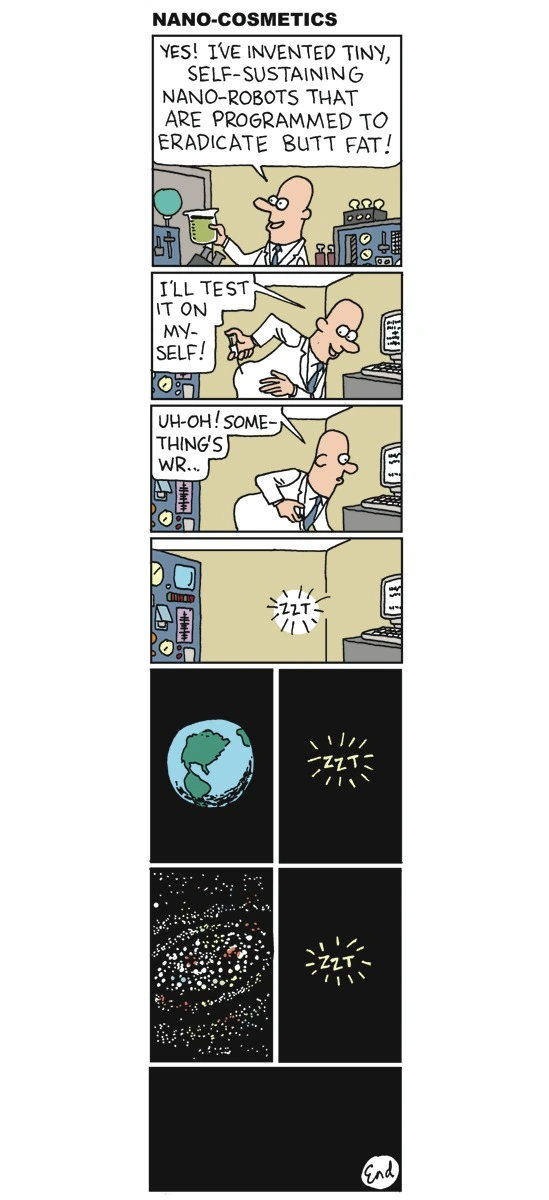It's never safe to experiment with replicators. Just ask the asgard how that turns out.
Turns out they were after butt fat all along
The Assgard.
Is that why the asgard were so emaciated? They modified their clones to have a complete absence of butt fat?
It's hard to get fat on those little sustenance cubes
I like the yellow ones 🟨
Grey goo is a fun idea but doesn't really work.
Radiation would cause replication errors in the nanobots, eventually leading to speciation. Before you know it you just have an ecosystem again, with a whole food chain of butt eradicators and paperclip maximizers.
Butt Eradicators and Paperclip Maximisers
Sorry this will be my band name now
a fellow universal paperclip enjoyer, i see
Grey goo also doesn't work because it'd almost certainly use the same building blocks as life, and in a competition with life, life's probably going to be the winner. Even if it didn't, unless it's doing weird cold fusion subatomic interactions (probably impossible) to make more of whatever element it's composed of, it'll just run out of food in whatever local environment it's in.
I don't think this is necessarily true. The reason DNA is so affected by radiation is because it's malleable. It's built out of chemical building blocks that fit like Lego. Gray goo would likely be similar to extremely complex proteins which replicate like a physical version of a quine.
IIRC the bigger issue is that the nanobots would end up just melting themselves, to avoid this they'd have to work a lot slower, probably at about the rate of a particularly fast acting bacteria.
Whilst I agree that universal consuming nanobots are a bit far fetched, I’m not sure I’m sold on the replication problem.
Life has replication errors on purpose because we’re dependent on it for mid to long term survival.
It’s easy to write program code with arbitrarily high error protection. You could make a program that will produce 1 unhandled error for every 100000 consumed universes, and it wouldn’t be particularly hard, you just need enough spare space.
Mutation and cancer are potential problems for technology, but they’re decidedly solvable problems.
Life only makes it hard because life is chaotic and complex, there’s not an error correcting code ratio we can bump from 5 to 20 and call it a day.
Wait, it's all butt fat?
Always ass been.
Logic checks out. The whole universe is ass.
The term gray goo was coined by nanotechnology pioneer K. Eric Drexler in his 1986 book Engines of Creation. In 2004, he stated "I wish I had never used the term 'gray goo'."
Lmao
He accidentally created a self-sustaining technology and released it into the wild where it replicated beyond his ability to control it.
gray goo? more like gay goo amirite
im sorry i dont know
When you right you right.
Fuckin gottem
We will simply stop climate change by programming nano robots to absorb carbon atoms from everything they touch. - Elon Musk, probably.
I saw this one, Bender turns all the water into alcohol, right?
Seems like it wouldn't really matter who he tested it on.
Nanomachines decided the most effective way to remove butt fat is to replace it with the true vacuum
What's it called... Kasakov cascade, or something like that?
zzt
Comic Strips
Comic Strips is a community for those who love comic stories.
The rules are simple:
- The post can be a single image, an image gallery, or a link to a specific comic hosted on another site (the author's website, for instance).
- The comic must be a complete story.
- If it is an external link, it must be to a specific story, not to the root of the site.
- You may post comics from others or your own.
- If you are posting a comic of your own, a maximum of one per week is allowed (I know, your comics are great, but this rule helps avoid spam).
- The comic can be in any language, but if it's not in English, OP must include an English translation in the post's 'body' field (note: you don't need to select a specific language when posting a comic).
- Politeness.
- AI-generated comics aren't allowed.
- Adult content is not allowed. This community aims to be fun for people of all ages.
Web of links
- !linuxmemes@lemmy.world: "I use Arch btw"
- !memes@lemmy.world: memes (you don't say!)
